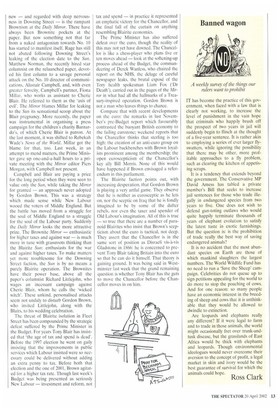Banned wagon
IT has become the practice of this government, when faced with a law that is clearly not working, to increase the level of punishment in the vain hope that criminals who happily brush off the prospect of two years in jail will suddenly begin to flinch at the thought of a five-year sentence. It is rather akin to employing a series of ever larger flyswatters, while ignoring the possibility that there may be other, more profitable approaches to a fly problem, such as clearing the kitchen of appetising scraps.
It is a tendency that extends beyond the government. The Conservative MP David Amess has tabled a private member's Bill that seeks to increase jail sentences for those who trade illegally in endangered species from two years to five. One does not wish to defend gun-toting outlaws who would quite happily terminate thousands of years of elephant evolution to satisfy the latest taste in exotic furnishings. But the question is: is the prohibition of trade really the best way of saving endangered animals?
It is no accident that the most abundant species on Earth are those of which mankind slaughters the largest numbers. The World Wildlife Fund has no need to run a 'Save the Sheep' campaign. Celebrities do not queue up to sign petitions appealing for the world to do more to stop the poaching of cows. And for one reason: so many people have an economic interest in the breeding of sheep and cows that it is unthinkable that they would be allowed to dwindle to extinction.
Are leopards and elephants really any different? If it were legal to farm and to trade in those animals, the world might occasionally fret over trunk-andtusk disease, but the grasslands of East Africa would be thick with elephants and leopards. Though environmental ideologues would never overcome their aversion to the concept of profit, a legal market in skin and ivory would be the best guarantee of survival for which the
animals could hope. Ross Clark






































































 Previous page
Previous page